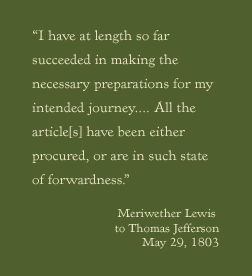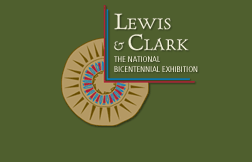

|
 |



INTRODUCTION TO UNIT
Target Grade Level:
Elementary and Middle School, Grades 4 - 8
This unit focuses on Meriwether Lewis's preparations for the expedition. It uses Lewis's trip to Philadelphia as a foundation for students to consider the idea that life is a journey of discovery. Students will understand some of the challenges inherent in preparing for the unknown and will learn about the preparations necessary for Lewis and Clark's expedition. They will use maps and paintings to gather information about Philadelphia in 1803. By reading primary and secondary documents, students will learn about the people Lewis met with in Philadelphia, and they will discover why each person's area of expertise was deemed important for Lewis's preparation. Students will gather and classify information from documents to determine what items were taken along on the expedition and for what purposes. They will learn how discoveries can be guided and shaped by expectations, supplies, and knowledge. Students will reflect upon the idea that our life is a journey of discovery, and along the way we need to prepare by predicting what we will need to have and what we will need to know.
Explore Connections to Today for this unit.
MAJOR UNDERSTANDINGS
Preconceptions shape preparation.
ESSENTIAL QUESTIONS
- How do you prepare for the unknown?
- How can you predict what you'll need to know?
- How can you predict what you'll need to have?
KEY KNOWLEDGE OBJECTIVES
Students will:
- know the relative and geographic location of Philadelphia, PA, and its importance as the intellectual center of the nation and a port for trade and commerce at the time of the expedition
- know that the purpose of Lewis's visit to Philadelphia in 1803 was to procure supplies and equipment for the expedition and to learn information from experts
- know that the American Philosophical Society membership was a leading source of information for Lewis
- know that Lewis met with these people:
- Andrew Ellicott of Lancaster, PA: astronomy and surveying
- Benjamin Smith Barton: botany and ethnology
- Robert Patterson: astronomy
- Dr. Benjamin Rush: medicine
- Dr. Caspar Wistar: fossils
- know that Lewis procured supplies in these categories: transportation, camping, medicine, arms, mathematical instruments, presents and books, maps and tables
KEY SKILL OBJECTIVES
Students will:
- gather information from a map to determine relative and absolute location
- examine and gather information from paintings
- make inferences based on observations of paintings
- read and analyze primary and secondary documents to draw conclusions
- identify and classify objects from documents and photographs
- evaluate the importance of items from the expedition
- reflect upon the value or appropriate nature of gifts
FORMATIVE ASSESSMENT SUGGESTIONS
- Students will write daily observations and responses in journals.
- Students will gather information for a Philadelphia map.
- Students will record observations about paintings on an analysis chart.
- Students will synthesize important information about people and record it on an attribute web.
- Students will identify and classify objects according to their use.
[PRINTABLE VERSION]
|
 |






